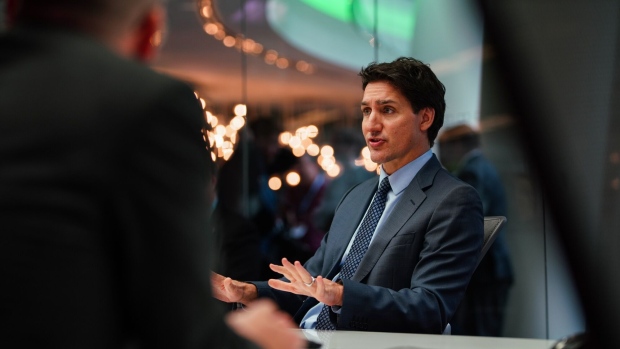Apr 28, 2023
Trudeau warns companies not to expect same handout as Volkswagen
, Bloomberg News

Firms building electric-vehicle components in Canada won’t necessarily get the same massive subsidy package that Volkswagen AG just received, Prime Minister Justin Trudeau said.
Canada signed a deal to subsidize the German automaker’s production of electric-vehicle batteries by as much as $13 billion over 10 years. The agreement means Volkswagen plans to build an enormous new factory, employing thousands of workers, at a site in Ontario about two hours from Detroit.
When asked whether every other company building a battery plant can expect the same deal, Trudeau said no.
“We are prepared to step up and make sure that we’re competitive” with U.S. manufacturing subsidies, Trudeau said Friday during an interview at Bloomberg’s headquarters in New York. “But we’re going to look at each one on a case-by-case basis. We will think strategically about this” and not just say yes to any firm, he said.
In addition to Volkswagen, Stellantis NV and LG Energy Solution have said they’re interested in setting up a battery-making facility together in Windsor, Ontario.
Earlier this month in Washington, Trudeau’s finance minister, Chrystia Freeland, warned that democracies cannot get into a “race to the bottom” on corporate subsidies or they’ll erode their tax bases, harming their ability to pay for social programs.
Despite the money his government rolled out for Volkswagen — and the roughly $80 billion in long-term investment tax credits it promised in its latest budget for a variety of industries — Trudeau argued he’s still guarding against a subsidy war.
Volkswagen, he said, almost certainly left money on the table when it chose Canada over certain U.S. states for its first EV battery plant in North America.
“I don’t know what other jurisdictions offered, but I’m fairly confident that they were willing to go further than we were able to go” with financial incentives, he said. Canada’s clean electricity grid, its labour force and its public health care system were also factors that helped persuade Volkswagen to build the plant in St. Thomas, Ontario, he said.
The prime minister said Canada can’t afford to fully match the U.S. subsidies available under last year’s Inflation Reduction Act. “If we were to try and match dollar-for-dollar the equivalent of the IRA, we’d lose our triple-A credit rating, quite rightly,” he said. “So we do have to be thoughtful and strategic about this.”
Trudeau acknowledged that the global economy is heading for “choppy waters” after central banks raised interest rates quickly to curb inflation. That process has been difficult for many borrowers and for some banks — especially regional lenders in the U.S.
The prime minister said he thinks financial system problems seem to be contained. “I think any disruption in banking is something to be alert to,” he said. “Canada has extraordinarily solid banking systems” that performed well during the 2008 financial crisis, he noted.
His government is facing some political pressure to wade into the battle over the future of Vancouver-based Teck Resources Ltd., which is trying to fend off a takeover approach from Glencore Plc. Trudeau’s main political rival, Conservative Party Leader Pierre Poilievre, this week called on the government to block a Glencore takeover of Teck, the country’s largest domestically-controlled base metals miner.
The Glencore-Teck fight is “certainly something that we’re looking very, very carefully at because it is important to have these great companies in Canada,” Trudeau said. He promised that the government will be consistent in applying federal takeover rules “so investors can know what they’re getting into.”
“What’s more important to me is the company behaving the right way towards the environment, whether it’s a local company or a foreign multinational,” he said. “We have high and stringent expectations, not just on environmental issues but on partnership with Indigenous peoples."





